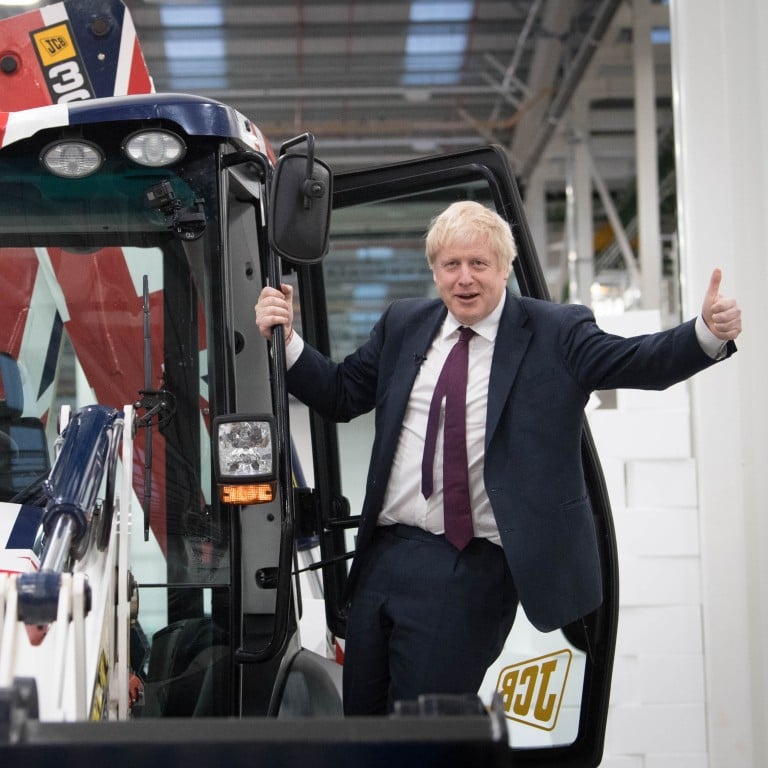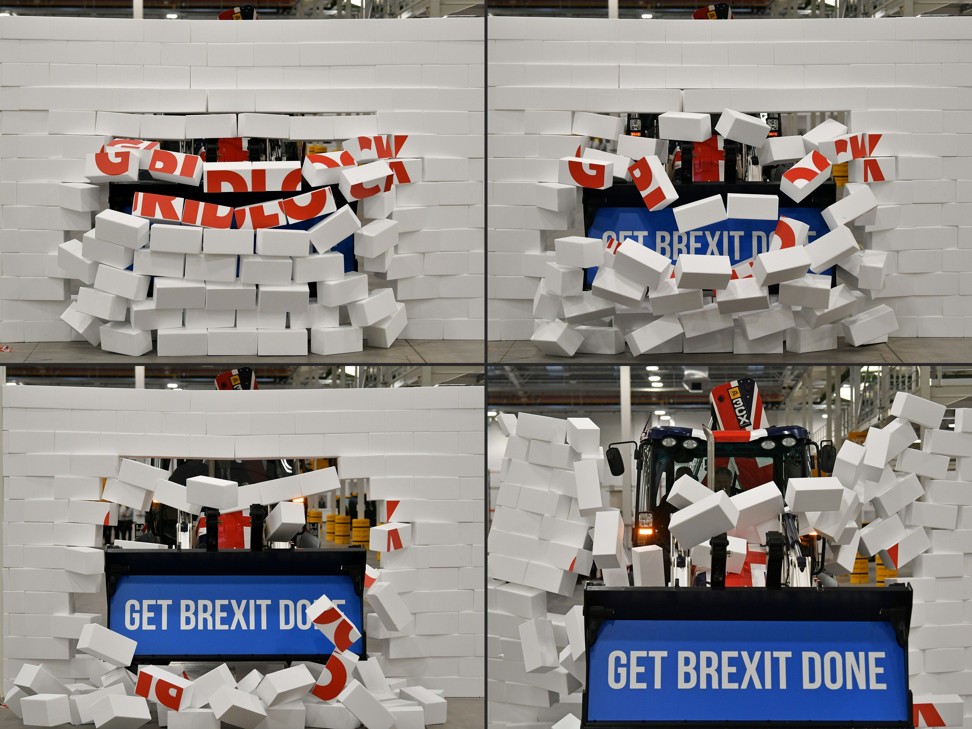
Boris Johnson resorts to publicity stunt as UK election becomes ‘tight fight’
- Boris Johnson hopes to secure a majority government that would allow him to take Britain out of the European Union on January 31
- But a new YouGov poll, which correctly forecast Theresa May’s 2017 upset, showed election outcome could be hanging in the balance
As British voters head to the polls today for what could be a historic general election, Prime Minister Boris Johnson’s goal of a parliamentary majority to push through Brexit was, as he put it, turning out to be a “tight fight”.
The final poll by YouGov, a closely watched forecast published late Tuesday, narrowed the Conservative lead to just nine points over Labour, giving Johnson a majority of just 28 seats, down from 68.
Jeremy Corbyn’s Labour Party clawed back 20 seats it was slated to lose in the last YouGov poll, published in late November.
Founded by Nadim Zahawi a former junior minister in Johnson’s last government, YouGov, which makes predictions for every constituency, accurately predicted no clear Conservative majority in the 2017 election.
Boris Johnson under fire after grabbing reporter’s phone when shown photo of sick boy
“Like all predictions our model comes with some uncertainty, and the margin of error here could put the final number of Conservative seats from 311 to 367. This means that we absolutely cannot rule out the 2019 election producing a hung parliament – nor can we rule out a larger Conservative majority,” YouGov said.
The poll predicted some Liberal Democratic gains, including in the Foreign Secretary Dominic Raab’s seat of Esher and Walton in the Surrey stockbrokers belt, where he now has just a two-point lead.

The Labour bounce back came largely from metropolitan “Remain” areas like the southwest London constituencies of Putney and Battersea.
Even Johnson’s predicted historic wins in formerly diehard Labour heartlands after Nigel Farage’s Brexit party stepped aside, the so called “red wall” in the deindustrialised Midlands and the North of England, are looking less certain.
Johnson is still hoping to mirror the success of US President Donald Trump among working-class voters in America’s rust belt.
Britain’s election is getting nasty
On Tuesday he grabbed television headlines by driving a mechanical digger through a styrofoam wall marked ‘Gridlock’ at an industrial machine factory owned by a party donor in Staffordshire.
The simplistic Tory campaign slogan ‘GET BREXIT DONE’ was emblazoned across the front blade. Johnson then emerged, victorious, from the digger’s cab.
These kind of publicity stunts are unusual in British politics but this is no ordinary election, with all the major parties led by personalities not popular with voters, and with Brexit cross-cutting traditional party loyalties.
Johnson followed up his demolition exploit with a tweet: “We have two days to get Brexit done”.
However, even if he wins and manages to pass his Brexit deal through the House of Commons, having cleansed the party of “unbelievers”, it will take a lot longer than that.
A Conservative majority would enable the UK to leave the 28-nation European Union on January 31, but Johnson’s pre-election agreement with Brussels leaves fundamental questions unanswered.
EU negotiators would likely block UK market access to its largest trading partner if Johnson insists on scrapping some of the EU’s business regulations, environmental and social rules, The Financial Times reported Tuesday.
Difficult trade-offs would be necessary to reach even a limited trade deal in the year transition period that ends in 2020. That would leave the prospect of a hard crash-out with no trade deal still a distinct possibility.
In the UK, how would a Jeremy Corbyn government engage China and the Hong Kong protests?
If his majority is razor thin, and he needs to rely on Northern Ireland’s Democratic Unionist party that has propped up the Tories since 2017, Johnson would guarantee there will be no border checks between the UK territory of Northern Ireland and the EU member the Republic of Ireland to the south. It emerged last week that promises he had made to that effect were false, according to the EU.
And what if there is a hung parliament? Who will be prime minister then?
“There are absolutely no hard and fast rules in the UK, in marked contrast to other European countries which have established those rules over decades under proportional representation,” said Tim Bale, a politics professor at Queen Mary University, London.

Instead, the parties would have to enter into what is known as “freestyle bargaining”.
“It’s not about who’s the largest party having some preordained right to have first go at forming a government, even though many people believe that to be the case,” Bale said.
“It’s actually about who has the best chance of forming a government, whether that’s a minority administration or a coalition. In the event of a hung parliament, that would almost certainly be Labour since the Conservatives will find it harder to find another party to do a deal with them.”
Willie Rennie, the leader of the Scottish Liberal Democrats, said Johnson and Corbyn were both unfit to be prime minister, so the party nationally would not do any agreement that puts either in power.
The British Chinese running in the 2019 UK general election
The Lib Dems would be more likely, however, to back Corbyn in a no-confidence vote against the government, in order to force through a second EU referendum, now part of Labour Party policy.
And what if the polls prove to be completely wrong, and Corbyn manages to scrape through with a majority, even if only one seat?
The Scottish National Party, which is expected to make substantial gains in Scotland where the majority are opposed to Brexit, have said they would join a Labour government, on the condition they hold another Scottish independence referendum, which this time they could win.

The third general election in four years, not including the 2016 EU referendum, EU Parliament and local elections, there is a danger many people won’t bother to vote at all after three years of endless debate over Brexit, especially in the poorer areas of the country. That would likely hurt Labour.
Bad weather on Thursday in the first winter election for almost 100 years could put off the elderly from voting, many who are for Brexit and would vote Conservative.
Johnson could also suffer a hit if “Remain” voters, both Liberal Democrats and Labour supporters switch to tactical voting to keep out the Conservatives, and stall Brexit. Pollsters predict tactical voting could give Labour and the Lib Dems up to 30 seats.
Two former prime ministers from both Conservative and Labour, John Major and Tony Blair, have called for voters to vote tactically, to “hold their noses” and select the “Remain” candidate most likely to win, even if they don’t like the party or its leader.
Additional reporting by Agence France-Presse

